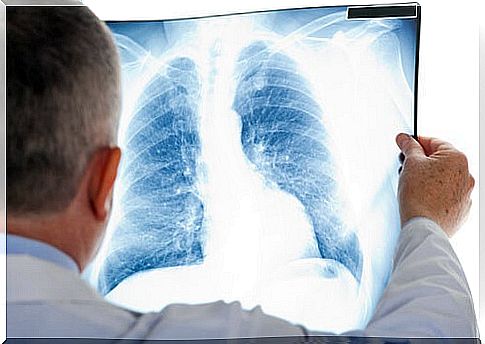Pleuritis: Symptoms, Causes And Treatment
Pleurisy is also called pleurisy . Both terms designate the same situation: an inflammation of the thoracic membrane known as the pleura.
The pleura is a thin tissue that lines the lungs and separates them from the chest wall. Actually, the pleura has two parts; one of them is attached to the lung and the other to the chest wall itself.
Between the two laminae of the pleura there is a tiny space. This space is known as virtual because it does not exist or is made evident, unless something occupies it. Air can occupy this space, constituting a pneumothorax. Likewise, a liquid substance can make it, constituting a pleural effusion.
It is not uncommon for pleurisy to be associated with pleural effusion. When the pleura is inflamed it can produce inflammatory fluid that is deposited in the pleural space. This indicates that different disorders of the pleura can respond to the same cause.
Causes of pleurisy
The causes of pleurisy are different. These are some of the disorders that can cause inflammation of the pleura:
- Autoimmune diseases: some autoimmune diseases are capable of attacking the pleura. This is the case with rheumatoid arthritis, for example, which is a cause of pleurisy.
- Lung cancer: oncological disease of the respiratory system can attack the pleura. Sometimes the pleural membranes become inflamed due to proximity to the primary tumor, and other times because lung cancer metastases lodge in the pleura.
- Pneumonia: when suffering from pneumonia, be it of bacterial or viral origin, the pleura becomes inflamed by the same infectious process.
- Mycosis: there are fungi that infect humans, precisely in their internal organs, and that can take the pleura as a base. Fungal pleuritis is difficult to treat because antifungals take a long time to use to start working and because the access of drugs to the pleura is not as fast as it happens with other organs.
- Chest trauma : trauma to the chest and to the side of the chest wall, more precisely to the ribs, are associated with pleurisy. Inflammation happens out of solidarity and closeness to neighboring structures.

Symptoms of pleurisy
The characteristic sign of pleurisy is chest pain. In general, it is severe but intermittent pain, exacerbated by coughing or taking deep breaths.
Along with the pain appears dyspnea. Dyspnea is the shortness of breath perceived by the patient, either on inhalation or on exhalation. As in a vicious cycle, it can happen that overexertion to breathe makes chest pain worse. Other symptoms will depend on the cause of the pleurisy.
- In pneumonia there will be added fever and cough.
- In lung cancer, you will have weight loss, anemia, or changes in skin color.
- When an autoimmune disease occurs, the joints are usually affected, for example.
If the pleurisy is accompanied by a pleural effusion, the characteristic pain will vary somewhat. The fluid accumulated in the effusion increases pain in certain postures and positions of the body. Dyspnea is also more evident due to the pressure of the effusion on the lung.

Treatments
The treatment of pleurisy will largely depend on the cause that originated it. Let us remember that it is not a disease with an entity in itself, but rather it is a situation derived from another pathology.
The pain of pleurisy is managed with anti-inflammatories, regardless of the original cause. A commonly used drug for pain management is ibuprofen. In more serious cases, morphine drugs and their derivatives can be used.
When pain is increased by coughing, the use of cough suppressants is evaluated. In any case, they are not always recommended because coughing is a defense mechanism used by the body in order to solve an atypical situation.
For infections the treatment will be the antimicrobial that works against the invading agent. There are pneumonia, fungal infection and flu protocols that determine what steps to take at each stage.
If pleural effusion is associated with pleurisy, the doctor will evaluate the need for drainage. The fluid contained in the pleura can be removed to the outside with certain procedures. Not all spills require draining.
The existence of a pleurisy always forces to find the cause. Health professionals will request the complementary methods they consider appropriate to reach a diagnosis. Once the cause is established, a treatment can be carried out to resolve the underlying situation.









